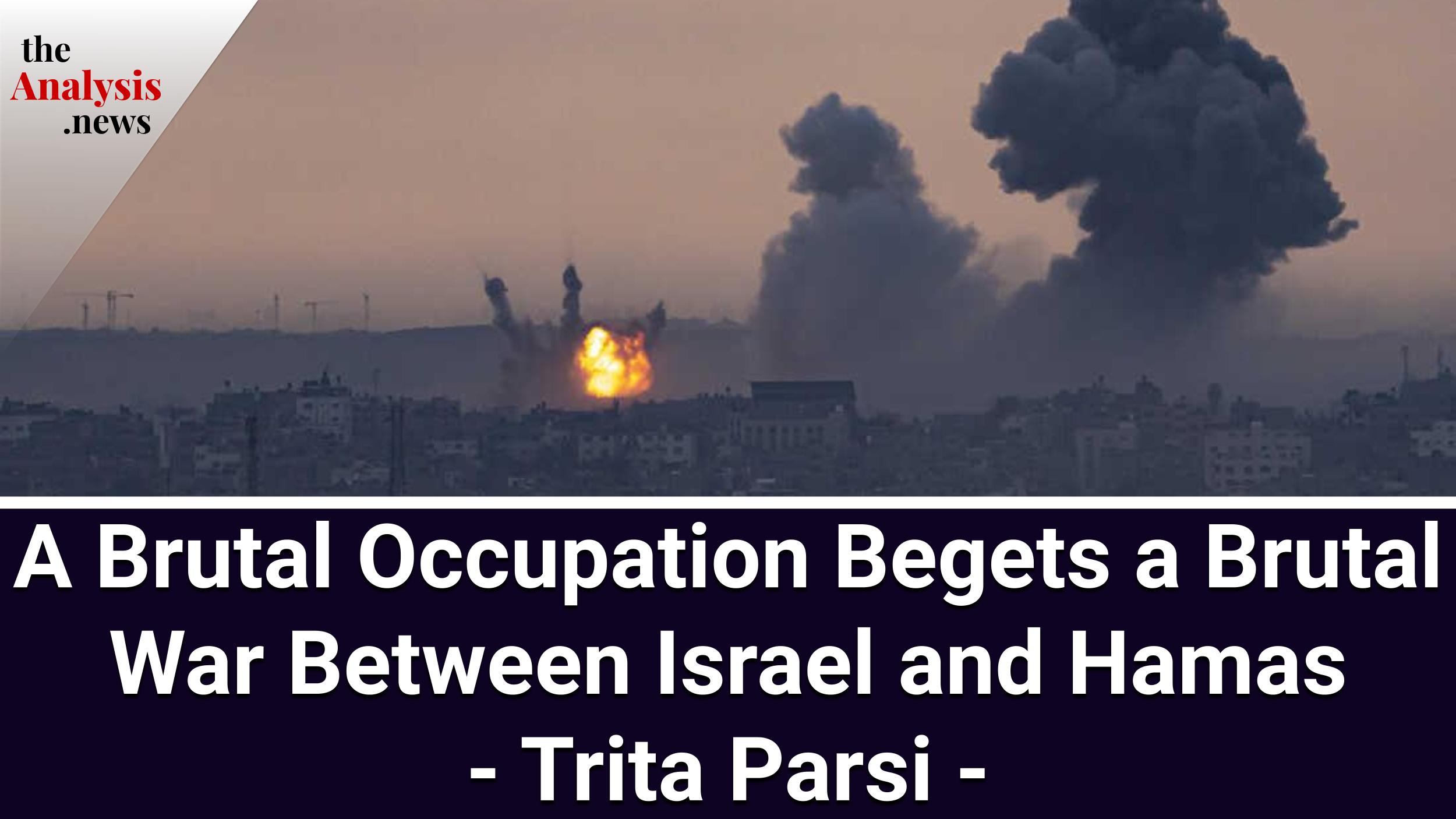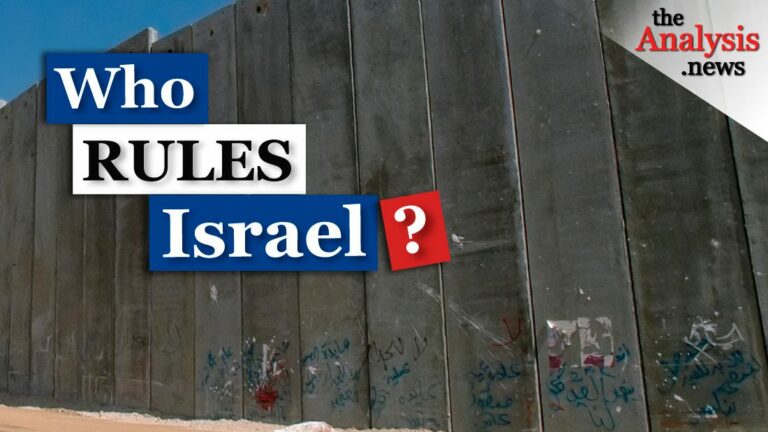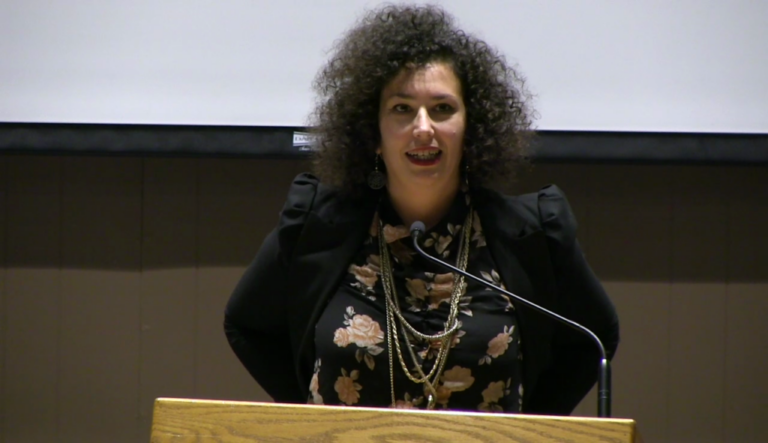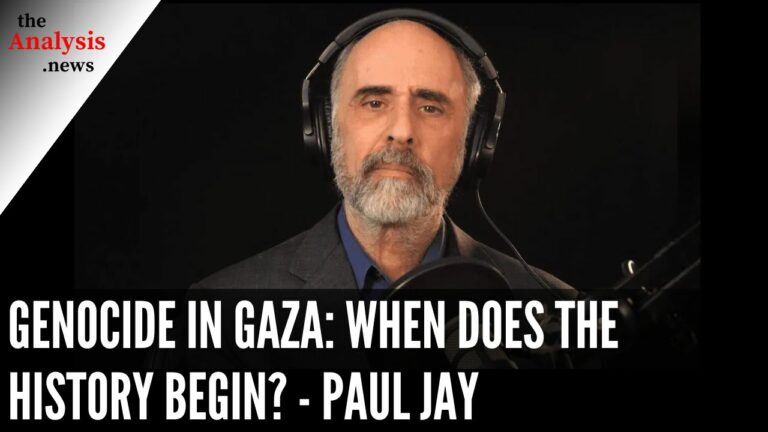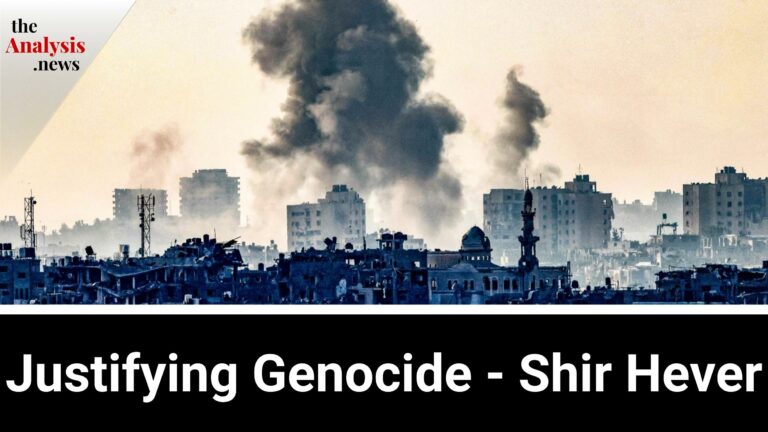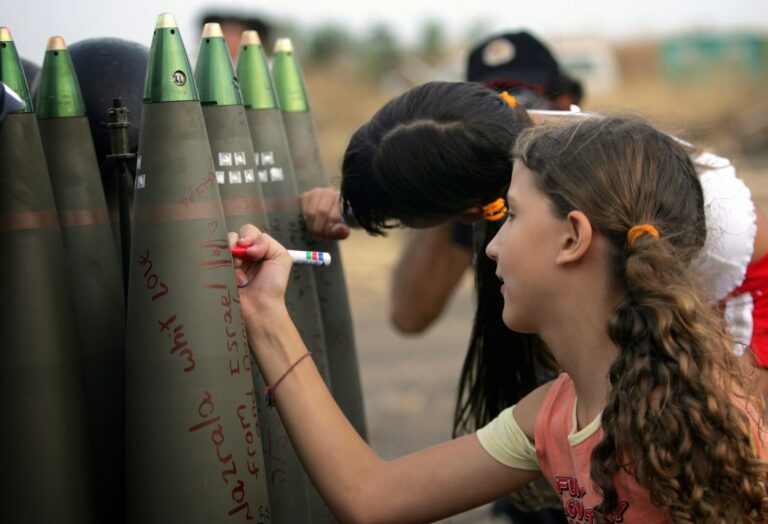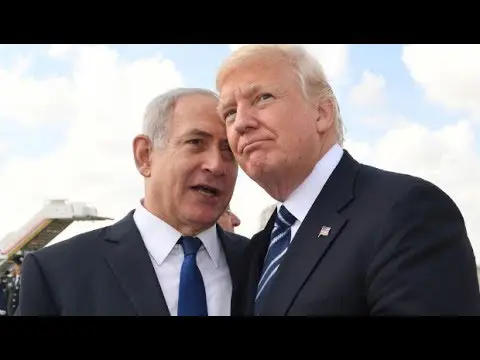A Brutal Occupation Begets a Brutal War Between Israel and Hamas – Trita Parsi
Trita Parsi, Executive Vice President at the Quincy Institute for Responsible Statecraft, analyzes Iran’s role in supporting Hamas’ brutal coordinated attack on civilians in Israel. Parsi unpacks Palestinian grievances, as well as Israel’s indiscriminate bombardment and illegal blockade of Gaza. With host Talia Baroncelli.
Talia Baroncelli
Hi, I’m your host, Talia Baroncelli, and you’re watching theAnalysis.news. Joining me today is Dr. Trita Parsi to speak about the hostilities committed by Hamas and Israel over the past weekend and the ongoing violence. If you would like to support this program, you can do so by going to our website, theAnalysis.news, and hitting the donate button at the top right corner of the screen. Please get onto our mailing list; that way, you’re always updated once there’s new content published. Also, like and subscribe to our podcast wherever you watch this show. See you in a bit with Trita Parsi.
Joining me now is Trita Parsi. He is the Executive Vice President of the Quincy Institute for Responsible Statecraft. Thank you so much for joining me today, Trita.
Trita Parsi
My pleasure. Thank you so much for having me.
Talia Baroncelli
I wanted to get your response to the violence we’ve seen in Israel and in the Gaza Strip. A few days ago, on October 7, we saw Hamas militants cross over into Israel and indiscriminately massacre civilians. The death toll on the Israeli side is now upwards of 700 civilians, and over a hundred hostages have been taken back to the Gaza Strip by Hamas militants. In response to these attacks, Prime Minister Benjamin Netanyahu has declared war on Hamas, and the Israeli military has launched an aerial campaign on the densely populated Gaza Strip. The death toll on the Palestinian side is now upwards of 600 civilians. Given the blockade on Gaza, which is limiting food, medical supplies, and electricity to Gaza, the death toll will most likely or inevitably increase.
This is all happening against a backdrop of Netanyahu supporting illegal settlements in the West Bank and the violence of settlers against Palestinians there. There was an incident in which a Palestinian gunman killed four Israelis, and some settlers ended up torching an entire Palestinian town in response. The history here is something that can’t be ignored.
The Wall Street Journal did publish a piece insinuating that Hamas received assistance from Iran in launching these attacks. What do you say to that?
Trita Parsi
Well, if we start off from the beginning of your question, obviously, these are horrific events. Countless war crimes are taking place now on both sides. What I don’t think one can say necessarily is that this is surprising. Certainly, the scale of the Hamas attack and the technological advancement that they showed is probably surprising. But the idea that something like this would happen, meaning that there would be a return to violence, cannot be said to be surprising.
In fact, part of the reason why I think some are surprised is because they truly believed that the Palestinian issue was no longer a real crisis and that Europe had forgotten about the Palestinians. The United States certainly had, and now Arab leaders were increasingly doing so. Then, of course, the Arab street had been embroiled in its own Arab Spring for a decade and was looking inward rather than toward the Palestinian issue. That was entirely wrong, and it was predictably wrong because the Palestinians were not going to forget the Palestinians, and that there’s impossibility of having continued, almost permanent blockade, occupation, and expecting that violence wouldn’t erupt again, particularly as the West is indicating that they’re all buying into the idea of an Abraham Accords, meaning that the Arab States would move beyond the Palestinian issue and normalize with Israel without any significant changes on the ground in terms of giving the Palestinians their national rights.
Unfortunately, at some point, some form of eruption of violence was very likely, and this is now what we’re seeing. I think that premise, the idea that one could move beyond the Palestinian issue, has been predictively disproven, but it’s been disproven in a much, much more brutal and horrific way than many had expected.
As to the question of Iran’s involvement, I don’t think there is any doubt that the Iranians are supporting Hamas. I don’t think there’s any doubt that the Iranians are providing weapons to Hamas. That is different, however, from saying that the Iranians were operationally involved, or as the Wall Street Journal said, that they essentially gave a green light to this operation. I find that unconvincing for a variety of reasons.
First of all, Hamas’s relationship with Iran is not such that they would seek or demand or request a green light from Iran or that they would put themselves under the command of the Iranians. More so, take a look at what the U.S. side is saying. The administration is denying any evidence indicating that Iran was involved, and so are the Israelis, incidentally. The Israeli spokesperson for the IDF has come out and said that there’s no evidence of Iran’s involvement.
I think that story was flawed in many different ways, including the idea that since August, there had been bi-weekly meetings between the heads of Hamas, Islamic Jihad, Hezbollah, and the Iranians, including, on two occasions, Iran’s foreign minister. All of this took place in Beirut, and the Israelis did not pick up on this. That’s beyond the type of intelligence failure that this operation has been an indicator of showing on the Israeli side. This makes it a much, much larger intelligence barrier. One that is so large that I have a hard time believing it.
Now, having said that, if I could make one last point. I think it is important to recognize that the Iranians actually do want the world to believe that they had something to do with it. They want to have plausible deniability in the sense of being able to say that they didn’t, but they’re happy if there is a belief that they probably did have something to do with it. In their view, it boosts their credibility in the region amongst the populations, particularly amongst the Arab street. It puts them in a stronger position in their claim for regional leadership, particularly vis à vis their rival, Saudi Arabia. We have cases in the past in which the Iranians may not have had anything to do with a specific attack but nevertheless benefited from the perception that they had something from it. I think that’s the game that they’re playing right now.
Talia Baroncelli
Well, to pick up on your previous point, Secretary of State Antony Blinken also said that there’s no evidence that Iran was involved. But there are, of course, Republicans who are pointing the finger and saying that it’s a result of the Biden administration unfreezing $6 billion of Iranian assets, which actually funded this attack. This is absolutely nonsense because we know that there are certain stringent regulations and measures as to how this money can be used by Iran. It is primarily for humanitarian or medical purposes, as I understand it. That’s another thing to take into account. Do you really think that Hamas launched this attack in response to normalization between Arab states and Israel? Or was it more just to get back some of their prisoners who are being held in Israeli jails?
Trita Parsi
I think the normalization that I mentioned may have been one consideration. I don’t think it was the driving force of this. Again, a lot of commentary in the West suggesting that that is the sole reason for this seems to be departing from a point of ignorance about the situation of the Palestinians. Just because Western media has not been reporting the things you pointed out, for instance, the expansion of the settlements, the burning down of the Palestinian villages, the ongoing blockade and occupation of Gaza and the suffering of the people there, doesn’t mean that that is not true and that that would not be the primary motivation for Hamas to lash out in the manner that it has. The fact that it likely would have this impact on normalization is probably something that has crossed their mind, probably something that they see as beneficial. I’m not so certain that that is a driving force behind this. One can definitely imagine that if they wanted to ruin the atmosphere for normalization, there are probably things that Hamas could do that would be of far lower and smaller scale than this that would nevertheless still achieve that objective.
I do think that this goes well beyond that, but I do, at the same time, think that there is validity to the question because this is going to have an impact on this. At a minimum, it seems like it’s very difficult for the Saudis not to increase their ask on the Palestinian dimension of that question, which is one that probably has been the one that the Saudis were most open to sacrificing. Now I think it’s going to be more difficult for them to do so. But it’s happening at a moment in which the appetite for any concessions to the Palestinians is going to be essentially at zero on the Israeli side. In the short term, it probably makes a deal impossible. But then, in the medium and the long term, of course, it remains to be seen how this all plays out.
Talia Baroncelli
Do you think that given the controversy around Benjamin Netanyahu given the protests against his very controversial judicial reforms, there will be a rallying around the flag? We have also seen some journalists and more left-of-center newspapers in Israel saying that the response to these attacks in Israel was that they were caught off guard, they hadn’t been prepared, and that it took several hours for certain representatives from the military and the government to even make a statement. A lot of people have been left in the dark. They don’t have electricity in the southern parts of Israel, they don’t really know what’s going on, and they’ve been forced to rely on some local media to find out what’s going on. How do you assess the government’s response and how Netanyahu will be remembered?
Trita Parsi
I think in the short term, there is going to be a rallying around the flag effect. That is what we see in other countries. That is also what we have seen in Israel in the past, particularly after the 1973 war that also took Israel by surprise. In the longer term, however, there is going to be introspection, as there was after the failed Israeli invasion of Lebanon back in 2006. A damning report came out of that, showing the many, many errors and flaws and miscalculations on the Israeli side. I suspect that we will see an extremely damning report coming out, but it’s not going to happen now. At this moment, the impact and the consequences on the Israeli side are likely going to be rallying around the flag and a short-term benefit for the Netanyahu government, politically.
Talia Baroncelli
Well, so far today, I haven’t seen Saudi Arabia condemn the attacks launched by Hamas. I do want to ask you why you think that would be because they’ve been in this process of trying to negotiate normalization with Israel. They haven’t signed on to the Abraham Accords like countries like the United Arab Emirates, but they’ve been in that process, so to speak. Why is it that they haven’t condemned the attacks? What political function does that serve? After that, I also want to speak to you about the pact that Saudi Arabia and the United States would potentially be signing.
Trita Parsi
On to the first question, I think, again, the statement that has so far come out of the Saudi government is from the Saudi Foreign Ministry. They have taken a position similar to that of Qatar and even of Iran, in which they are blaming the occupation, and they’re pointing to the root causes of the conflict and not expressing the type of condemnations that clearly the Israelis and the United States would want to see.
Now, why is that? Well, the Foreign Ministry has taken a more traditional Saudi position on this over the course of the last couple of years. The statements coming out of MBS, the Crown Prince, have oftentimes differed, sometimes quite substantially. We have not seen any commentary from MBS on this yet. That’s going to be very interesting, not only in and of itself, but also to see whether there is daylight between that statement and that which came out of the Foreign Ministry.
Why would the Saudis express themselves in this way? I think, well, part of it is, again, at a moment in which the Palestinians are resisting, eyes are going back to the Palestinian issue, the suffering of the Palestinians. It’s a moment that is very difficult for the Saudis to suddenly look as if they’re indifferent to that, particularly if other countries, Iran and others, are expressing a position that looks at the root causes, avoids the condemnation of Hamas, etc., or even tries to take credit for what is taking place there. That puts the Saudis in a difficult bind. A bind that was always likely to happen at the end of the day because all of these normalization conversations have taken place in a context in which the assumption has been that the Palestinian issue is dormant and is going to remain largely dormant, that it’s not really something that needs to be addressed. That has now been conclusively proven wrong and dangerous, I think.
Now, as to the question of what’s in such a deal, I think the administration, the Biden administration, really picked it up where Trump left it off. They’ve been pursuing the very same policy as Trump when it comes to this issue, but perhaps with the aim of outdoing Trump by being able to get Saudi Arabia, which is obviously a much bigger prize, and to get the UAE to normalize with Israel.
In order to achieve that, they’re going to immense lengths in terms of the type of concessions that they are considering offering the Saudis, which includes a security pact. There’s never been one between the United States and Saudi Arabia— an Article 5 type of security pact, which would bind the United States to defend the Saudi kingdom, as well as nuclear concessions that would grant the Saudi’s enrichment capacity, access to the fuel cycle without the type of extremely strict restrictions that were put on the Iranian nuclear program.
These are frankly concessions that just eight months ago were unthinkable. Now, it’s something that the Biden administration is seriously considering, which I frankly think is showing a degree of desperation on the administration side. I think they’re negotiating this in a way that is really letting MBS demand more and more and more, and the administration is giving more and more and more without really getting anything of particular value to the United States in return. Particularly when it comes to regional stability, since it’s not really addressing the Palestinian issue but ignoring it, it lays the ground for even more violence down the road, unfortunately.
Talia Baroncelli
Well, yes, you mentioned that this particular security pact, which obviously hasn’t been signed yet, would require Congress to sign a treaty or perhaps be passed by a presidential executive order. It would guarantee Article 5, NATO-style security guarantees to Saudi Arabia.
There are two big things which stand or which you would think would stand in the way of this, and this is the five-year anniversary or commemoration of the killing of journalist Jamal Khashoggi, as well as a 2016 declassification of documents from a joint Senate and Congress inquiry into 9/11 by former Senator Bob Graham, which actually did show that there were ties between the perpetrators of the 9/11 attack and Saudi Arabia. How is this even possible that they could, in light of these two grave instances, actively continue negotiating this security pact?
Trita Parsi
I think you’re putting your finger on something very important. I think a lot of people thought that this was so unlikely that they didn’t pay attention to it. They didn’t think that the administration was serious. Now, it’s become a reality that this is actually very seriously considered, and the administration is considering extreme concessions to the Saudis on this issue.
Now, I think the only way they could get this through is by combining it with normalization, a full package in which their hope is that the argument that this is such a historic breakthrough will compel members of the Senate to vote in favor of it because they want to look as if they’re on the right side of history or whatever metaphor they use. But I think that was also a calculation at a moment when most people in the Senate were not paying attention to this issue. All eyes were either on Ukraine or on Taiwan. As a result, there could have been, or there seemed to have been, a pathway for them to get this through the Senate without much resistance.
I think that is changing now. We saw a letter last week from 20 Democratic senators expressing deep concern about some of these concessions. I don’t think this is going to be the smooth sailing that the administration first thought. Particularly now in light of these attacks, I think also that is going to complicate it further, not just in the region in which neither the Saudi or the Israelis will have much appetite for it, but even on Capitol Hill, I think there’s going to be some pause.
Talia Baroncelli
Well, final question, and I did want to shift to Armenia. We have seen ethnic cleansing of Armenians from the Nagorno-Karabakh region. They’ve had to flee to Armenia. Azerbaijan hasn’t really faced any repercussions on the international scale for their involvement in this. This is obviously a very historic conflict, so it didn’t just start yesterday.
Given all the sanctions against Russia for its invasion of Ukraine, how is it that the international community hasn’t responded with any reprimand or repercussions for Azerbaijan?
Trita Parsi
It’s a great question. It’s the very same question that a lot of countries in the Global South asked themselves when the illegal invasion of Ukraine by Russia was framed as a major threat to the rules-based international order. That first seemed to presume that there was such a thing as rules that were binding to all. That’s something that a lot of countries question. But then, when they were asked to make significant sacrifices in the name of upholding that order, you saw that there were not a lot of buyers outside of the West and a few Asian countries. Part of the reason was precisely this: there was a clear awareness that this would be a one-off, that the rules would be applied now because this was important to the West, but as soon as another conflict emerged, it would be ignored. That conflict emerged within a year and a half, not too far away from Ukraine, even involving some of the other actors in the sense that Russia, of course, is a very important player in all of this. There was complete silence and an ignoring of this issue.
We’re seeing ethnic cleansing taking place there. We’re seeing the Azeris getting help from Israel in doing all of this because the military success that they’ve had is very much partly a result of training and weapons coming from Israel. We even saw Ukrainian President Zelenskyy thanking the dictator of Azerbaijan for helping uphold the principles of sovereignty and national boundaries in a tweet. Again, it shows how unevenly these rules are being applied and why a lot of countries in the Global South are not going to make any sacrifices, upholding an order that is only there to benefit those who control it rather than benefiting all of the countries in the system.
I think we’re reaching a breaking point on this issue. I don’t think it is going to be possible to continue in this pattern. I’m not saying anything is going to change tomorrow, but the shifts in power globally are such that it is really difficult to see how this status quo will be tolerated for much longer. What the alternative is is really difficult to predict. Ideally, it would be a reinvigoration of the global governing structure and a significant improvement. But perhaps a more likely scenario is that it will be a global order that gets so fragmented that it essentially becomes not just a multipolar world but a multi-order world, which is difficult to see how that ultimately will be positive for the world as a whole, particularly mindful of the fact that we need global action, coordinated action to address transnational threats such as climate change and pandemics. How can that happen in a multi-order world?
Talia Baroncelli
Well, it’s quite evident that multi-order worlds will be juxtaposed with this imaginary rules-based order, which Western diplomats seem to think exists.
Trita Parsi, the Executive Vice President at the Quincy Institute for Responsible State Craft, thank you so much for joining me here.
Trita Parsi
Thank you for having me. I appreciate it. Thank you.
Talia Baroncelli
Thank you for watching theAnalysis.news. If you’d like to support our show and help us continue to create this content, please go to our website, theAnalysis.news, and hit the donate button at the top right corner of the screen. We really can’t do this without you, and we appreciate all your support. See you next time.
Podcast: Play in new window | Download
Trita Parsi is the co-founder and executive vice president of the Quincy Institute for Responsible Statecraft, as well as the founder and former president of the National Iranian American Council.
